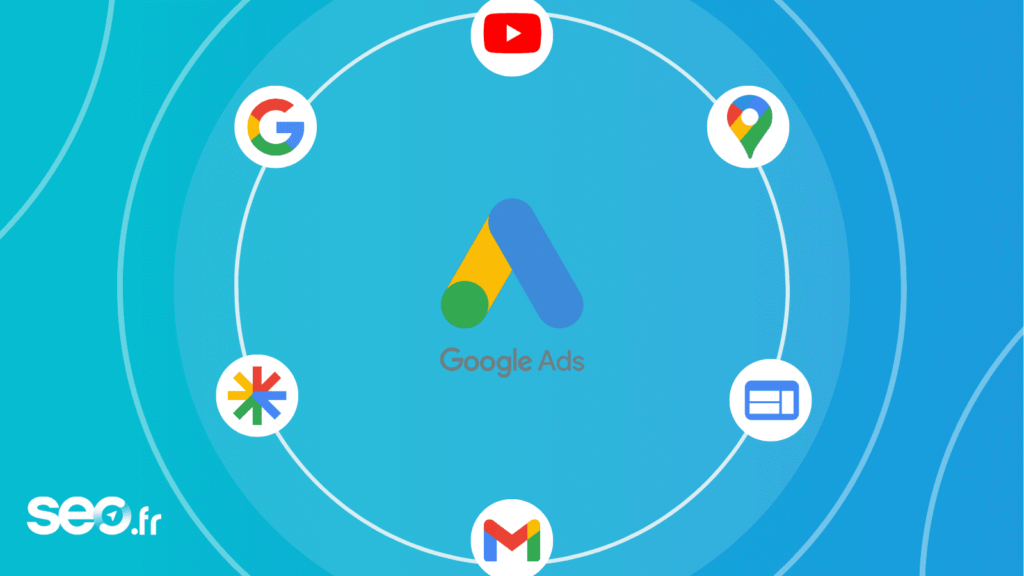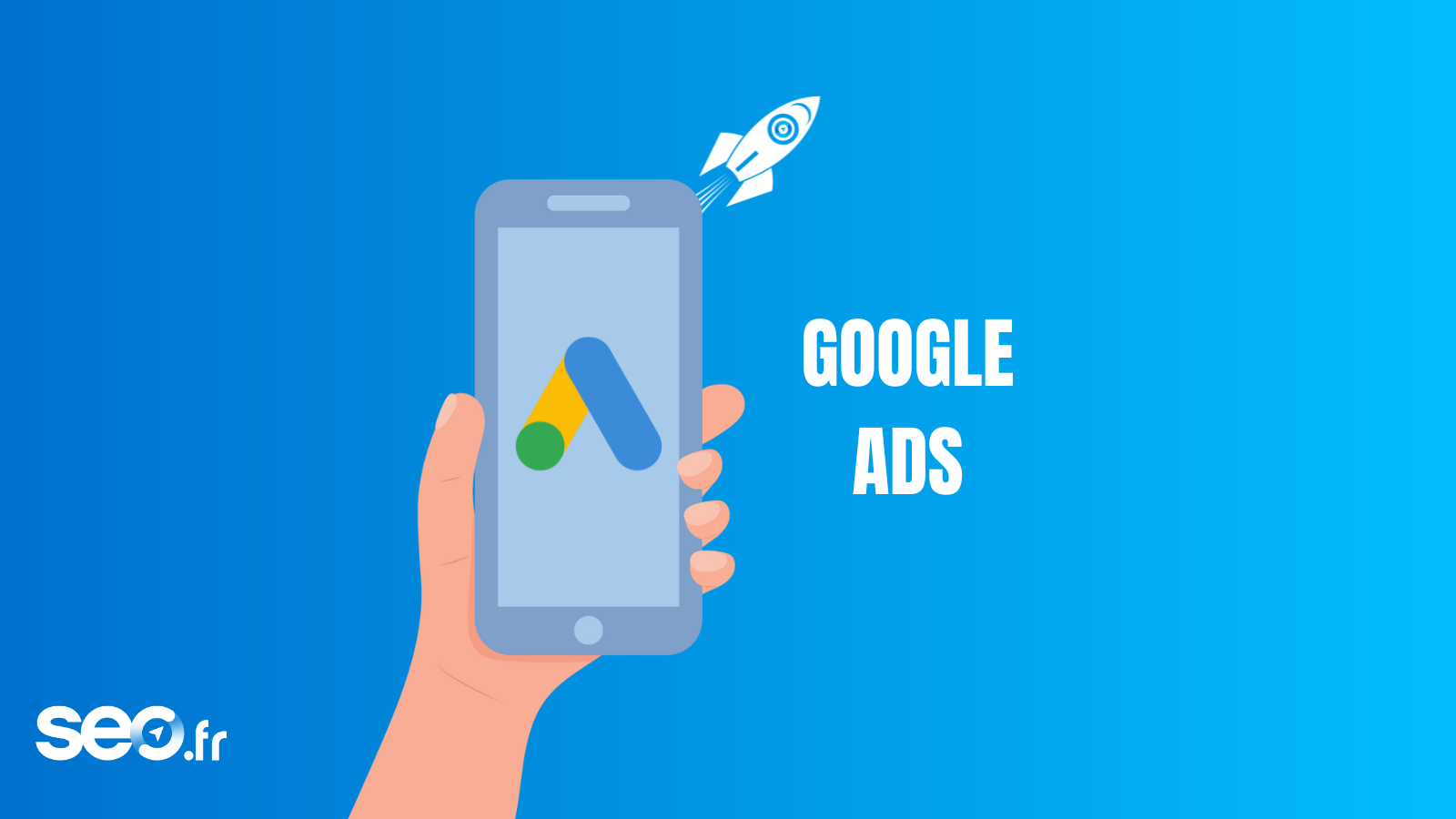Google Ads is an essential visibility lever. Often contrasted with SEO, it is in fact complementary to natural search engine optimization, which together form the two pillars of any good online visibility strategy.
Google Ads, Google’s advertising platform
Created in October 2000, Google Ads is Google’s advertising platform. After 18 years, it changed its name to Google Ads.
Google ads are displayed on the first page of Google. One of the key locations is directly above the search engine’s natural results, offering advertisers first-rate visibility.
This visibility is all the more important as the presentation of these ads is now virtually identical to that of the natural results. The only difference is that the term “Ad” precedes the URL of the page.

A targeted, high-quality audience
The advertising network is aimed at entrepreneurs and companies wishing to develop their digital audience by relying on the leader in search in Europe and France.
Based on keywords selected by the advertisers themselves, Google Ads are displayed according to the query typed by the user into the search engine. In fact, this system offers a major advantage over other communication levers, since it makes it possible to offer a response corresponding to the user’s search, and therefore to target the audience with great finesse.
How do sponsored results work?
The main principle of Google Ads is that you can “buy” keywords. This is not really a purchase, but an auction, on which the advertiser positions itself in order to appear on the search engine.
Let’s take the example of a web user searching for “silver spoons”. Once the query has been validated, Google will check whether any companies have bid on this term. If several of them are competitors, the order in which the sponsored results are displayed is determined by Google’s algorithm on the basis of several criteria:
- The “Quality Score” of your ad. This takes into account the user experience (e.g. bounce rate, time spent on the page) and the relevance between the sectioned keyword, the ad and the site.
- The maximum bid previously set for the expression or word
- The percentage of users who clicked on the Google Ads ad as a function of the number of times it was displayed
Do you have a SEA question?
Julia can help
7 years of SEA expertise

If you want to be among the “best” sponsored links, those that web users discover at first glance (eye tracking), you need to ensure that your bids, click-through rate and Quality Score are as high as possible. To achieve this, you first need to develop a keyword strategy, write relevant ads and carry out the necessary optimizations, including on the landing pages, to increase the conversion rate.
For the most relevant results possible, Google Ads also integrates geographic targeting of ads, enabling local businesses to develop their reputation and their activity. What’s more, there is no limit to the extent to which campaigns can be customized. In particular, ads can be refined by limiting their display on certain types of device (computers, tablets, etc.).
Budget and return on investment
Creating a Google Ads campaign may be relatively straightforward, but getting a good return on investment is far less so.
The advertising platform provides an intuitive interface that allows you to create your first campaign in no time at all. However, although a monthly budget can be set, this traffic lever can very quickly squander the marketing budget in question if it is not properly controlled, especially when it comes to highly competitive keywords.
By entrusting your Google Ads campaign to our SEA agency, you benefit from a genuine digital strategy with very precise visitor targeting. This is backed up by our expertise and performance reports, enabling you to optimize your campaign on a daily basis. Depending on the number of clicks, the visitor path and the amount of money already allocated to the campaign, these adjustments ensure a higher return on investment for every euro invested.
SEA complements SEO
Search Engine Optimization (SEO) and Search Engine Advertising (SEA) are two powerful and perfectly complementary ways of increasing your visibility on the Internet:
- SEO: this is a long-term visibility strategy aimed at making your site appear in the natural results for keywords relevant to your business. This is the result of numerous optimizations in line with Google guidelines, particularly in terms of AMP, loading times, editorial content and netlinking.
- SEA: unlike SEO, paid results provide instant visibility, ideal for the short or medium term.

The advantages of SEA
There are 4 major advantages to creating and optimizing advertising campaigns on Google Ads:
Immediate increase in traffic: as long as it is perfectly optimized, the publication of an ad will result in an instant surplus of visitors.
Targeted audience: as the ads are displayed according to the search results of Internet users, the audience obtained thanks to this advertising network is perfectly targeted. More than just visitors, this is an audience potentially interested in your products or services. This makes it the perfect lever for generating leads or sales.
Flexibility: only SEA allows you to control your audience in almost real time, by adjusting your ad, keywords and bidding budget.
Detailed monitoring: statistics and tracking enable you to improve the performance of each ad for a better return on investment
SEA, to generate conversions quickly
Any good digital visibility strategy has two inseparable components: SEO and SEA. While the latter is particularly useful for sending traffic to a freshly created site, it can have many other marketing uses:
- Appear on a crowded local search: ever since Google started taking the geolocation of Internet users into account, natural results have often been pushed far down the page, after paid results and Maps. Google Ads is the ideal way to increase your visibility locally
- Appear on an ultra-competitive query that requires an excessive SEO budget
- Support a one-off marketing action such as a product launch, boost your visibility during a strategic period for your business (Christmas, sales, etc.) or promote an event
- Reinforce your brand image
- Test the marketing of new products or services
- Analyze visitor behavior on a site
- Identify relevant terms and keywords for SEO purposes
Would you like to find out more about creating and setting up SEA campaigns? Discover our Google Ads training course given by our training manager, Sylvain VIDAL.









